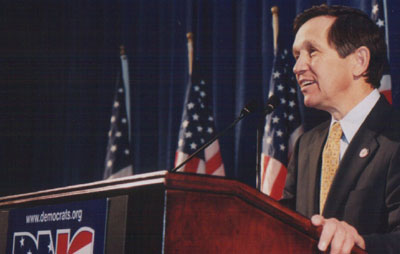Democratic presidential candidates and space: a primerLieberman and EdwardsSenators John Edwards and Joe Lieberman, of North Carolina and Connecticut, respectively, have fallen from the top tier of candidates but remain in the race, looking for a better-than-expected performance in the early states to revive their campaigns. Lieberman, who had been silent on space issues prior to the reports of Bush’s announcement, spoke out against a potentially expensive new initiative. Bush, Lieberman said in Saturday’s Baltimore Sun, “must be from another planet if he thinks that, with his fiscal priorities, we can get there [Mars] and at the same time make America stronger… We should find a way to go to Mars—but not at the exclusion of improving health care, shoring up Social Security, creating jobs and strengthening homeland security here at home.” Lieberman elaborated on those views on the CNN program Late Edition on Sunday. When asked if sending humans to the Moon or Mars was worth the money, he said: You know, I have very mixed feelings about it, but I’ll make clear where I end up. Remember, I was attracted into politics by President Kennedy, so the moonshot program thrilled me, and I’ve always supported the space program. But if you ask me whether the best use of $1 trillion of American taxpayer money in the coming years is to land a mission on Mars or the moon, I’d say no. We need it right here on Earth to give health care that’s affordable to everybody, to improve our education system, and do better on veterans’ benefits and homeland security. Lieberman went on to describe a plan he had to develop “an American center for cures” that would seek cures to cancer, diabetes, and other diseases. “[F]rankly,” he concluded, “I think that’s more important to the American people than that kind of space voyage at this point in our history.”
Edwards, on the other hand, had remained silent on both the proposed new space policy and space in general. A review of releases on his Senate web site turns up virtually nothing, other than a June 2002 release where he announces he has arranged for a North Carolina State University graduate student to receive a $24,000 grant from NASA to “design a commercial space hotel”. The language of the release showed that the senator or his staff seemed a little unfamiliar with the topic, referring at one point to a “NASA space hotel”. Bringing up the rearThe final thee candidates—Ohio Congressman Dennis Kucinich, former Illinois Senator Carol Moseley-Braun, and the Rev. Al Sharpton—are near the bottom of virtually all polls and have no chance of winning the nomination. But while Moseley-Braun and Sharpton have remained quiet on space issues, Kucinich has been more active. He has introduced legislation in recent years to ban the use or stationing of weapons in space (known as HR 3657, the Space Preservation Act of 2003, in the current Congress), and is a cosponsor of Rep. Nick Lampson’s Space Exploration Act of 2003 (HR 3057), which sets ambitious goals for human missions to the Moon and Mars. Kucinich was the only candidate to answer our original query to the campaigns last month, providing fairly detailed answers to each question. “I believe that abandoning manned space exploration would be an enormous mistake,” he wrote in response to the question about the shuttle and station. “The Columbia tragedy underscores a need for the development of safer space vehicles. Of particular interest to a Kucinich administration will be developing designs for spacecraft that take off and land like airplanes. Revitalizing the U.S. space fleet will be an important step in the United States regaining the edge in the broader field of space-based technologies.” Kucinich also supports a sharp increase in the size of NASA’s budget and new initiatives to bolster the agency’s workforce: The current budget for NASA is far from adequate. It is only due to a lack of funding that our shuttle fleet is based on 30-year old technology. Although the shuttle program requires $4 billion a year to operate, NASA has been forced to operate under shuttle budget of only $3 billion a year. I strongly believe that one of the best investments we could make for the future of America would be to triple the budget for NASA. Increasing the funding to NASA would be an empty gesture if we fail to invest in the human capital of the aerospace industry. Only six of every hundred American engineering students are training to pursue careers in aerospace. This must change if we hope to restore our prominence in space technology… Initiatives such as designing new spacecraft, new propulsion systems, and planning international missions into space will help to renew national interest in NASA.
However, while Kucinich has expressed his support for a bigger, stronger, NASA, he does not endorse the expected new space initiative Bush is set to announce. Speaking at a debate in Washington, DC, on Friday, Kucinich said he was a “strong supporter” of NASA, but opposed the Bush plan. “Maybe what they’re getting ready for is a war on Mars,” he quipped. “We have to keep an eye on them since they’re into unilateral [action] and preemption.” Even with the new presidential space initiative, space will continue to be a niche issue in the 2004 campaign: it will simply be too small in the grander scheme of affairs to matter to more than a small fraction of the American public. We can expect to see some more comment on the topic, particularly once the President formally announces his plan and offers some specifics as well as a price tag. We will revisit this topic later in the election cycle to see what additional insight the remaining candidates offer the electorate. Home |
|
